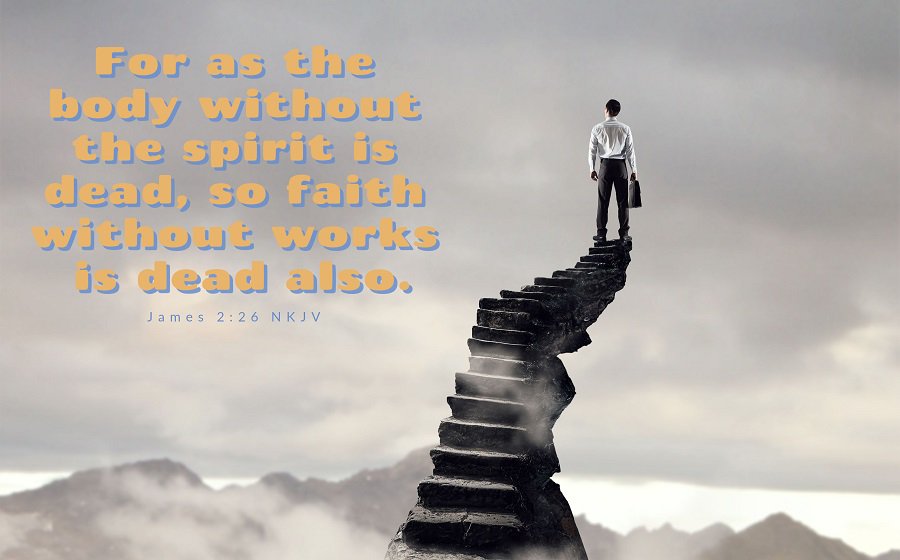
Jesus’ Discussion on Faith and Works
Nicodemus' Worldview Turned Upside Down
Nicodemus’ encounter with Jesus in John 3:1-21 (Click to read the story) highlights the tension between faith and works in existence since the Garden of Eden. In Jesus’ day, the Jewish religion was works-oriented. They finally figured out that being obedient to all that God instructed was critical to their nation’s welfare.
Unfortunately, they focused on obeying the letter of the law.
They created a checklist of dos and don’ts that everyone was expected to follow. Salvation was earned by behavior, circumcision, and temple services. A mindset that completely twisted their understanding of the character of God, transforming Him from a loving savior into an exacting taskmaster. Thus, it never occurred to them that they needed to be saved from their sins. Instead, they craved salvation from Roman tyranny.
Therefore, when Nicodemus joined Jesus for that fateful clandestine interview, he was confident of his place in heaven. When Jesus told him he needed to be born again through baptism and the indwelling of the Holy Spirit, he was flabbergasted. In one fell swoop, Jesus reduced this highly educated, well-respected member of the Sanhedrin, and Pharisee of Pharisees to the level of a common sinner who needed to repent and be baptized. This was not only shocking but offensive.
But Jesus didn’t stop there. He emphasized that salvation came only through faith in His own death on the cross. Period. No caveats.
Just like the Israelites had to exercise faith by looking at the bronze serpent on a cross to be healed of the deadly snake bite and receive their mortal life again (Numbers 21:4-9); we must exercise faith by looking to Christ on the cross so that we can be healed of sin and receive eternal life (John 3:14-15).
The Bible is very clear that nothing we do can merit salvation. It is a gift from God (Ephesians 2:8-9; Romans 6:23; John 3:16).
Was Jesus teaching that obedience (or what most call works) was not necessary then?
Not if you read the entire interview, especially verses 19-21.
“And this is the judgment: the light has come into the world, and people loved the darkness rather than the light because their works were evil. For everyone who does wicked things hates the light and does not come to the light, lest his works should be exposed. But whoever does what is true comes to the light, so that it may be clearly seen that his works have been carried out in God.”
John 1:4-9 identifies Jesus as the Light in similar language to the quote above. David referred to scripture as a light for our path (Psalms 119:105), and Jesus stated that the scriptures testified of Him (John 5:39). Accordingly, “the light” Jesus refers to is both Himself and the scriptures.
But here is where it gets interesting.
Those who are disobedient, who practice sin, hate the light and refuse to come to it because it exposes their sins. The only people who love God’s light are the ones who want to live in obedience to it, who want to put sin out of their lives and do what is right.
A crucial difference exists between their obedience and that of the Pharisees, however. Those who love God’s light and come and bask in it, allow the light to reveal how God empowers them to do their righteous deeds (John 3:21 NKJV).
In other words, without God working in us, we are incapable of doing the kind of good works that everyone recognizes as truly godly.
Jesus clarified the difference in John 14:15 when He said, “If you love Me, keep My commandments.”
This puts a different spin on obedience entirely.
Obedience (or works) doesn’t earn salvation. Jesus said as much when he told Nicodemus, a highly educated, law-abiding, circumcised Pharisee, that he needed to be born again.
Obedience also doesn’t earn God’s love. God’s love for us is eternal and unshakable, evidenced by the fact that even before He created the world, the Trinity’s plan to redeem us through the death of Jesus was already in place (1 Peter 1:20; Revelation 13:8). In reality, Jesus came to save us while we were still sinners (Romans 5:8). He loved us first, not the other way around (1 John 4:19).
Our good works simply reveal our love for God. If we love Jesus (God), we don’t want to do anything that would hurt Him; just as our love for our children or our spouse inspires us to avoid doing things we know would hurt them.
Sin hurts God. Jesus’ life and death are proof of that. He was maligned, hated, rejected, abandoned, abused, humiliated, tortured, and finally crucified, because everything He was and taught exposed people’s love of sin.
Those who prefer to continue in sin cannot live comfortably in the presence of God.
Therefore, if we love Jesus and want to live in a relationship with Him, we will choose to do what is right out of love; because we don’t want to hurt Him or be separated from Him.
Sin always separates God’s people from Him and thus blocks His protection, His provision, His intervention …His salvation. You cannot read the Old Testament prophets without hearing God desperately pleading with His people repeatedly to repent and come back to Him so He can save them; heal them of their sins.
Jesus’ death provided a way for us to be forgiven of our sins and become partakers of His divine nature again (2 Peter 1:4), enabling us to overcome sin. He did not die to give us permission to continue in it.
Jesus accepts us just as we are when we come to Him, but just like the woman caught in adultery, He states, “Go and sin no more.” (John 8:11)
James 2:14-26 contains an in-depth discussion of the relationship between faith and works (obedience). But the crux of the matter is in verse 26. “For as the body without the spirit (breath) is dead, so faith without works is dead also.” Thus, just as we cannot live without breathing, faith cannot live without obedience (or works). Our faith in Jesus’ death and resurrection to save us from sin and give us eternal life is evidenced by our obedience to His word. You cannot have one without the other and still be saved.
That’s why the Faith Hall of Faith in Hebrews 11 clearly shows the connection between the patriarch’s faith and their obedience.
Abel had faith in God’s promise that He would provide a savior, so he obeyed and offered the lamb as a sacrifice just as God had requested. If Abel had faith that God would provide a savior but refused to offer the lamb, he would have been no better than Cain and it would have availed him nothing (Hebrews 11:4).
Noah had faith in the word of God and so he obeyed and built the ark. If Noah had faith in the Word of God but never built the ark, he would not have saved himself and his family (Hebrews 11:7).
Abraham had faith that God would give him and his descendants a country, so he left Ur to journey to an unknown land. If Abraham had faith in the word of God but never left Ur, his faith would have been worthless (Hebrews 11:8-10).
So, faith without obedience is worthless; just as obedience without faith is pointless.
You cannot have one without the other and genuinely love God or want to be in His presence. They are two sides of the same coin. They are inseparable.
The astounding good news, however, is that when we come into the light, into a relationship with Jesus, He works in us to accomplish good works (Philippians 2:12-13). That’s why Paul stated that we “can do all things through Christ who strengthens” us (Philippians 4:13 NKJV). And Jesus said,
“Come to me, all who labor and are heavy laden, and I will give you rest. Take my yoke upon you, and learn from me, for I am gentle and lowly in heart, and you will find rest for your souls.” (Matthew 11:28-29)
Obedience is not drudgery because Jesus is in the yoke with us doing the heavy lifting. Thus, obedience becomes an act of love powered by faith in Jesus.
***Unless otherwise noted, all Bible quotes were taken from the English Standard Version
***********************
Were you blessed by this blog? Share it with a friend.
Click here to read first person stories from The Gospel of John.
Click here to explore Lessons from the Gospel of John.

I was blessed by your blog, it was enlightening and uplifting. Thank you for sharing your path with those who are still trying to grow in Jesus.
Thank you so much for stopping by and commenting. It is such a blessing to hear from those who read my blog. Many blessings.